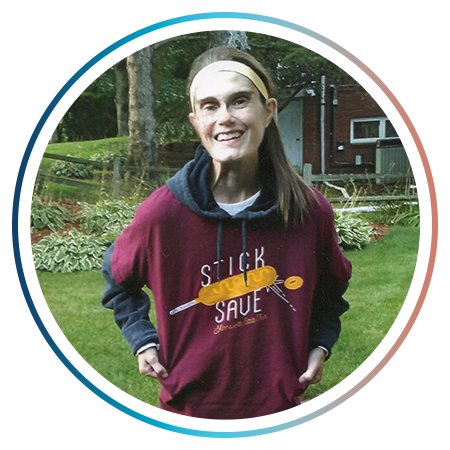“She was our ray of sunshine…our one and only,” say Tim and Dawn Bowman of their only daughter, Rachel. Their voices waver between joy and deep pain as they remember the light Rachel shined into the lives of those around her, even as she fought each day for her own.
After a nearly two-decades-long battle with a severe, enduring eating disorder, the Bowman’s lost Rachel in 2021. But by sharing her story, and through a bequest in her name—made through the Sanford Health Foundation—to the Sanford Fargo eating disorders program, they know her legacy will live on to help others.
Discovering a dangerous disease
Rachel was just 13, in the early 2000s, when her parents first noticed changes in her weight and eating habits. Connecting the dots, they arranged an appointment with Rachel’s pediatrician near their St. Paul, Minnesota, home.
“I’ll never forget taking her to the doctor, and she thanked us on the way for the intervention,” Tim recalls. “I felt so bad for her…she just didn’t understand what was happening to her.”
But rather than offering hope, the appointment foreshadowed the frustrations of navigating an illness that, even 20 years later, remains stigmatized and poorly understood. “We discovered that doctors didn’t really have a clue back then,” Tim said. “It was such a different type of disease; I could sense it right away.”
In her first years of treatment, Rachel was the youngest patient by far—a girl among young adults in their 20s and 30s. And the treatment approaches, she felt, could be overly strict and unkind. Slowly, despite all her strength and courage, the illness began to overpower everything else in her life.
“She lost her childhood,” grieves Dawn. “This disease just strips you of everything. It just takes and takes and takes. We love talking about Rachel, but the dark side of this is so dreadful.”

Inequities in treatment access
While treatment practices were evolving and not always a perfect fit, the Bowmans were still grateful to have access to options. Their insurance plan covered most of Rachel’s care, and they could handle out-of-pocket costs as needed—but Rachel’s peers often weren’t as lucky.
“We saw many of Rachel’s friends get booted out of treatment because insurance wouldn’t cover them anymore,” Tim says.
“That is crushing to see,” emphasizes Dawn. “When you think about the deaths caused by mental illness and eating disorders…it’s heartbreaking.”
Indeed, the facts today show eating disorders are among the most deadly of mental illnesses, second only to opioid overdose. They are also more prevalent than many realize: nearly one in 10 Americans of every age, gender identity, race and socioeconomic status will have an eating disorder in their lifetime—with the pandemic contributing to a recent spike among adolescents seeking care.
Finding acceptance
In her late 20s, Rachel’s struggles became increasingly severe. Seeking hope and a higher level of care, she discovered the Sanford Eating Disorders and Weight Management Center in Fargo. “The one thing that will always, always stick in my head is that Rachel said Sanford accepted her the way she was,” Dawn says. “The approach they used with her was different. It made her feel at ease.”
Rachel participated in the center’s in-patient and partial hospitalization programs on and off for nearly four years. She dedicated her days to working toward personal goals with a multidisciplinary team of psychiatrists, therapists, dieticians and other skilled staff.
For the first time, say the Bowmans, she found a true sense of belonging—not only in the program but within the Fargo community as well. They remember Rachel—always a smile on her face, dressed in her signature bright, colorful clothes—would spend her spare time exploring the neighborhoods surrounding the Sanford campus, jumping through lawn sprinklers in the summer and making friends with everyone she met along the way. She fell in love with Sandy’s Donuts, a local landmark, and never stopped dreaming of her future.
These are among the memories the Bowmans hold in their hearts—and what led them to honor Rachel’s life through the Sanford Fargo eating disorders fund. “Rachel was all we had,” explains Dawn when asked what inspired the planned gift in their will. “It didn’t take long for me to know it was what we wanted to do.”
“We love to remember Rachel in all times,” adds Tim. “There were good times and hard times as well. We enjoyed them all as the three of us made the best out of each and every moment.”
Their $300,000 bequest will keep the program’s mission strong and continue to give comfort and healing to all who need it.
“They took good care of her, and they loved her,” Tim says.
“We’re grateful, thankful and blessed for that,” adds Dawn.
“…And broken at the same time,” Tim concludes. “If we can help one person…to me, that’s great stuff.”
If you think someone you love has an eating disorder, find signs, symptoms and tips for taking action here.
PLAN TODAY FOR A HEALTHIER TOMORROW
The Bowmans are now members of the Legacy Society, a community of donors who are making Sanford Health a part of their lasting legacy. Through a future commitment—such as a gift in your will or estate plan—you can fuel the work of health, healing and comfort in your community, for good.
Contact us or discover free resources at sanford.giftlegacy.com.
